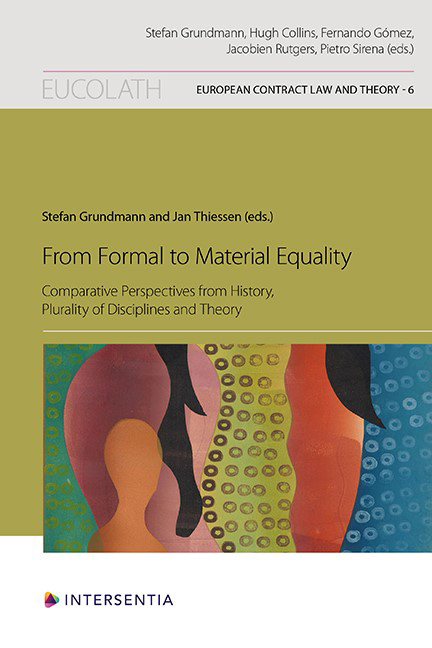 From Formal to Material Equality
From Formal to Material Equality Published online by Cambridge University Press: 15 November 2023
INTRODUCTION TO EQUALITY, HISTORY AND SOCIAL THEORY
Equality – the principle of equality, including principles of anti-discrimination that in many jurisdictions and/or languages are seen as specific principles of equality – appears in at least three manifestations in law. It comes in the form of legal norms (for example, Art. 3 of the German Constitution – Grundgesetz; Title III (Arts. 20 – 26) of the EU Charter of Fundamental Rights). It also comes – according to the understanding of fundamental rights – as an overarching legal principle. Finally, over a good two millennia, equality has even been perceived as the ultimate ratio and goal of law itself – if, with Aristotle, one sees equality as the essence of justice. Yet, despite this multilayered, comprehensive meaning of equality – the principle of equality, the principles of equality – in and for law, and despite the overarching character of the concept, two paradoxical main trends need to be seen for equality and the principles of equality. They have meant radically different things at different times in historical development (see below, section 2) and they are seen very differently in the circle of disciplines (see, paradigmatically, below, section 3 ).
Probably no other general legal concept – or, at best, freedom – has moved the history of the good and the right in society in a comparable and similarly controversial way as equality and the principle or principles of equality. Fraternity ( fraternité) – later solidarité, and later in the nineteenth century, and in the twentieth century, social justice – had, and have, a much more recent history, at least if one does not want to understand the Christian, fundamentally nonlegalised “charity” as a largely similar precursor. As a lived political and legal postulate, solidarity had a comparably powerful effect only in the second half of the nineteenth century, and fully only in the twentieth century. Equality and freedom, proclaimed as the two great (early) postulates of the two pioneering human rights declarations at the beginning of the “present”, are undoubtedly in a relationship of tension with each other, and are, therefore, also considered together selectively or more broadly in the following, and in many of the other contributions to this volume.
To save this book to your Kindle, first ensure [email protected] is added to your Approved Personal Document E-mail List under your Personal Document Settings on the Manage Your Content and Devices page of your Amazon account. Then enter the ‘name’ part of your Kindle email address below. Find out more about saving to your Kindle.
Note you can select to save to either the @free.kindle.com or @kindle.com variations. ‘@free.kindle.com’ emails are free but can only be saved to your device when it is connected to wi-fi. ‘@kindle.com’ emails can be delivered even when you are not connected to wi-fi, but note that service fees apply.
Find out more about the Kindle Personal Document Service.
To save content items to your account, please confirm that you agree to abide by our usage policies. If this is the first time you use this feature, you will be asked to authorise Cambridge Core to connect with your account. Find out more about saving content to Dropbox.
To save content items to your account, please confirm that you agree to abide by our usage policies. If this is the first time you use this feature, you will be asked to authorise Cambridge Core to connect with your account. Find out more about saving content to Google Drive.